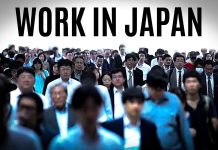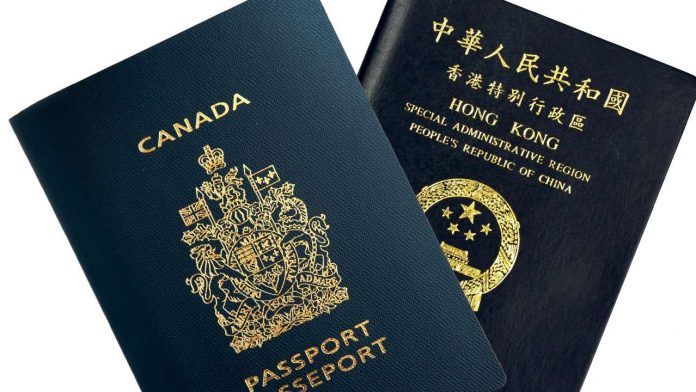Fears over high cost of living and political changes in city among suggested motives for rise in emigration applications, while estimated 300,000 already have a Canadian passport.
A 30 per cent jump in the number of Hongkongers applying to emigrate to Canada has left experts warning of a potential brain drain among a younger generation struggling to cope with the city’s high cost of living. Official figures show 1,561 people applied for permanent residency last year, and with an estimated 300,000 Hongkongers in the city already holding a Canadian passport, overseas experts have suggested this could point to a loss of faith in Hong Kong’s future among a demographic typically well educated and middle class.
Canadian government records show an upwards trend, with 1,206 Hongkongers applying for residency in 2016, 1,092 in 2015, 1,481 in 2014, 977 in 2013, and 963 in 2012. Dr Yan Miu-chung, a Hongkonger who moved to Canada in 1993 and is the director of the University of British Columbia’s (UBC) school of social work, said what was more worrying was that the 300,000 with Canadian passports living in the city could return to North America anytime and trigger a “talent drain”.
“From what I have observed, many are sending their children back to Canada to study,” he said. “The other phenomenon is that more and more of the middle class, who don’t have foreign citizen status, are sending their children abroad to study … so far we don’t know how many of them decide not to return to Hong Kong after they finish their study.”
Hong Kong needs hope to quell emigration concern
Last year, a record 1,270 Hongkongers were admitted as permanent Canadian residents, in the biggest influx to the country since 1997, the year Britain handed Hong Kong back to the Chinese, triggering unease about the city’s future. The admission figures were 1,210 in 2016, almost double the 630 permitted entry in 2015. Those numbers had remained largely consistent in preceding years, with 585 admitted in 204, 775 in 2013, and 719 in 2012.
Yan said many of those who could emigrate to Canada were well-educated middle-class families. Immigration applications from Hongkongers rose sharply after the Occupy movement in 2014 – a protest for universal suffrage that paralysed parts of the city for 79 days. “Apparently the increasing political tensions and the setback in democratic development are possible triggers that drove up this figure,” he said.
David Ley, professor emeritus of geography at UBC, noticed “clear demoralisation” about the future among some educated people he spoke to in Hong Kong. “Largely it was to do with fears of decreasing freedoms and declining human rights. A few were encouraging their children to leave and wanting to leave themselves. I think [having Carrie Lam Cheng Yuet-ngor as the city’s leader] is a symptom, not the cause,” he said.
“Of course, for young people there is also the impossible burden of the housing market. That has also led to some out-migration of young adults from Vancouver, another high-priced market,” he said.
Professor Paul Yip Siu-fai, a population expert at the University of Hong Kong, said the high cost of living in Hong Kong for the average professional was prompting many to emigrate to Canada, not just for themselves, but their children as well.
“The increasing number of new applicants each year is not comforting, as we are trying to build a smart city and we are short of talent,” he said.
Number of Hongkongers migrating to Canada hits 20-year high, stretching back to handover in 1997
Jeff Nankivell, Canada’s consul general in Hong Kong, said: “Although we do not have conclusive data that points to reasons behind the changes in numbers, we are pleased to learn that Canada is a destination being considered by Hongkongers,” he said. “Canada is proud of our diverse, multicultural and welcoming society. We truly believe that Canada is strong because of our diversity, not in spite of it.”
Hong Kong’s Security Bureau does not keep exact figures on how many Hongkongers have emigrated to Canada, which has always been a top destination because of its multicultural society. However, it estimated 6,500 did so last year, the lowest since 2006, and based this on the number of “certificate of no criminal conviction” applications – required documents for purposes such as emigration and overseas studies – made to police. But immigration consultants questioned the government’s figures, saying business had been booming.
One in five Hongkongers ‘considering emigration’ as pessimism hangs over city
According to the University of Hong Kong’s public opinion programme, satisfaction with the city’s government last month was at a net value of minus 18.8 per cent, worse than the minus 4.2 per cent when Lam became the city’s chief executive last July.
Alan Leung, 38, is one of the 300,000 people with Canadian passports who has decided to live and work in Hong Kong for now. His family emigrated to Canada before the 1997 handover for fear the 1989 Tiananmen crackdown – when China’s military violently suppressed a student movement for democracy – could also happen in Hong Kong. Leung moved back in 2008 for better work opportunities and is now with an insurance company, though he plans to return to Canada once his children have finished primary school and have a working knowledge of Chinese. But he did not entirely agree with demographic experts’ comments on the possible talent drain. “Even if we decide to move back later, it doesn’t mean we will settle in Canada forever. After my children finish university in Canada, they might decide to come back,” he said.
Meanwhile, more mainlanders have been admitted as permanent Canadian residents in recent years despite the scrapping of a popular migrant scheme. In 2014, the Canadian government axed the federal Immigrant Investor Programme due to an “almost insuperable” backlog, throwing out 65,000 applications. The scheme has been replaced by one with stricter criteria, which require applicants to loan the government C$800,000 (HK$5.14 million) interest-free for five years. Last year, 30,280 mainlanders were admitted as permanent Canadian residents, up from 26,855 in 2016; 19,535 in 2015; and 24,626 in 2014.
In a written reply, Canada’s embassy in Beijing said of the increase in emigration by mainlanders: “Canada is a welcoming and accepting country. Immigration has been a driving force in the progress that Canada has been able to make over many years.
“Generations of newcomers have come from all over the globe and have helped shape our prosperity, diversity, and our nation’s cultural fabric. Immigration has been, and will continue to be, a cornerstone of Canada’s success.”
This article appeared in the South China Morning Post print edition as: 30pc rise in HK residents eyeing Canada




















